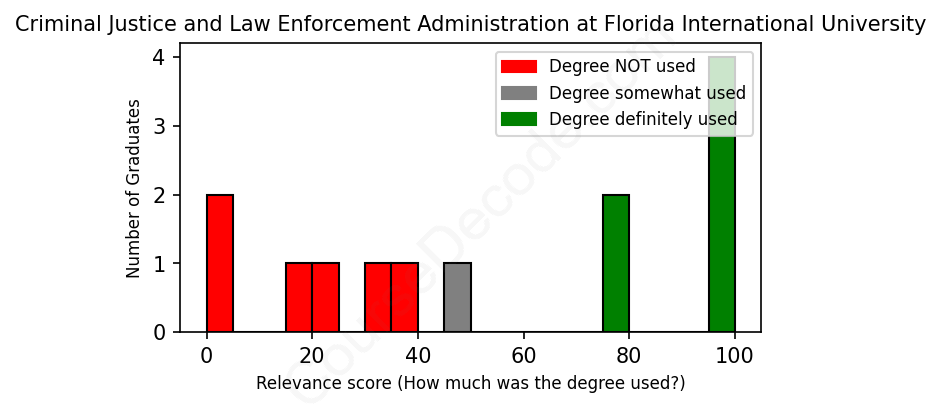
First, some facts. Of the Criminal Justice and Law Enforcement Administration graduates from Florida International University we've analyzed , here's how many have used (or NOT used) their degree in their career:

These are estimates based on AI analysis of 13 LinkedIn profiles (see below).
The verdict? Significantly below average. Overall, with an average relevance score of 53%, Criminal Justice and Law Enforcement Administration graduates from Florida International University have a much lower likelihood (-14%) of finding work in this field compared to the average graduate across all fields:
And for comparison, here's the chart for all profiles we've looked at across all degrees.
Also, after graduating, only 23% of these graduates have pursued further education other than another Bachelor's degree (such as a Masters degree or other), compared to the average across all profiles of 35%. This suggests a Bachelors degree is enough for most Criminal Justice and Law Enforcement Administration graduates, and it's normal to look for work straight after graduation.
See the details:
|
Relevance score: 16% We think this person has NOT gone into a career related to their degree. We think this person has NOT gone into a career related to their degree.
DEGREE INFOGraduated in 2017 from Florida International University with a Bachelor of Science in Criminal Justice and Law Enforcement Administration. Also pursued further education since (see below). JOB HISTORY SINCE GRADUATIONPrivate Tutor Grade Potential Tutoring Sep 2019 - May 2021 Law Clerk  Kirwan Spellacy, Danner, Watkin & Brownstein P.A. May 2021 - Sep 2021 FURTHER DEGREES DONE SINCE GRADUATINGDoctor of Law - JDSt. Thomas University College of Law 2019 - 2022 ABOUTWhen Im not on the job, I love running with my dogs, working my way through every recipe in the family cookbook, and indulging my love for seeing new places.If youd like to learn more about how my services can help your company, please reach out via email ([EMAIL REMOVED]). |
The top 10 most common jobs done by the graduates we've analyzed (ranked most common to least) are:
From analyzing the job profiles of Florida International University graduates who earned a degree in Criminal Justice and Law Enforcement Administration, it looks like there are a few common job types. Many of them have found positions as Paralegals and Law Clerks, which are definitely linked to their studies in criminal justice. These roles demand a solid grasp of legal principles and processes, so they’re a good fit for what these graduates have learned. We've also seen a few people take on roles in security, like Security Guards or Transportation Security Officers, which have relevance to their background in law enforcement.
However, it’s important to note that not all jobs held by these graduates relate closely to their degree. For instance, jobs like Customer Care Associate or Office Support Specialist don’t really use the specialized knowledge of criminal justice and law enforcement. In some cases, people ended up in totally different fields, like sales or tutoring, which don’t rely on any criminal justice skills at all. So while there are some strong career paths that are directly tied to their education, there’s also a significant number of graduates who seem to be in roles that don’t really align with their degree. Overall, if you’re looking to use that degree directly, there are good options out there, but not everyone has ended up in those fields.
Here is a visual representation of the most common words in job titles for Criminal Justice and Law Enforcement Administration graduates (this is across all Criminal Justice and Law Enforcement Administration graduates we've analyzed, not just those who went to Florida International University):

When you look at the career paths of graduates from Florida International University's Criminal Justice and Law Enforcement Administration program, it becomes clear that many of them start off in roles that are somewhat related to the law and justice field, even if not all positions fit perfectly. For example, several graduates began their careers as paralegals, showcasing a clear connection to legal work right out of the gate. Others dipped their toes into administrative or support roles within law enforcement agencies, like working in security or even as transportation security officers. These initial positions generally suggest that the graduates are at least attempting to align their careers with their education, which is a positive sign. However, some have ventured off into sales or customer service roles, indicating that not everyone sticks strictly to the criminal justice path early on.
Fast forward five years or so, and you'll see a mixed bag. Some graduates have climbed the ranks in governmental or legal positions, becoming field specialists or supervisors in relevant agencies, while others have moved into more corporate roles, such as account managers or marketing positions, which may not directly relate to their degree. For the most part, it appears that those who stayed within the law enforcement and legal sectors found more sustained career growth related to their studies, while others who pivoted toward different industries may have found it challenging to return to a criminal justice-based career. Overall, while there are some commendable success stories, there’s also evidence that not everyone ended up in roles directly related to their major, which is something to keep in mind when considering your career path.
Honestly, a Bachelor’s degree in Criminal Justice and Law Enforcement Administration can be a mixed bag when it comes to difficulty. At Florida International University, like many schools, you’re going to face a variety of courses that can range from super engaging to a bit challenging, especially if you're tackling topics like criminal law or forensic science. Overall, it's often considered easier than some other majors because it’s less about heavy math or science and more focused on understanding systems and principles, which can be pretty interesting if you’re into that stuff. As long as you're motivated and willing to stay on top of your readings and assignments, you should find it manageable!
Most commonly, in the LinkedIn profiles we've looked at, it takes people 2 years to finish a Bachelor degree in Criminal Justice and Law Enforcement Administration.
Looking at the job history of these Criminal Justice and Law Enforcement grads from Florida International University, it seems like they’ve had a mixed bag when it comes to making decent money. Some have worked their way up to more established roles, like the Sales Manager or Supervisory Transportation Security Officer positions, which typically pay better than entry-level gigs. However, others have positions like Data Entry Clerk or Customer Care Associate, which usually don’t pay as much, especially early in their careers. Overall, it looks like they’re on a decent path, but it might take some time for them to really start raking in the big bucks, especially since many are still quite early in their careers and some are just starting out in their fields.
Here is a visual representation of the most common words seen in the "about" section of LinkedIn profiles who have a Bachelor degree in Criminal Justice and Law Enforcement Administration (this is across all Criminal Justice and Law Enforcement Administration graduates we've analyzed, not just those who went to Florida International University). This may or may not be useful:

Here are all colleges offering a Bachelor degree in Criminal Justice and Law Enforcement Administration (ordered by the average relevance score of their Criminal Justice and Law Enforcement Administration graduates, best to worst) where we have analyzed at least 10 of their graduates:
| College | Score | Count |
|---|---|---|
 American Military University American Military University
|
81 | 10 |
 Columbia Southern University Columbia Southern University
|
70 | 16 |
 Western Illinois University Western Illinois University
|
63 | 20 |
 Columbia College Columbia College
|
59 | 10 |
 John Jay College (CUNY) John Jay College (CUNY)
|
57 | 11 |
 University of Phoenix University of Phoenix
|
54 | 88 |
 Florida International University Florida International University
|
53 | 13 |
 Park University Park University
|
53 | 23 |
 Virginia Commonwealth University Virginia Commonwealth University
|
34 | 10 |